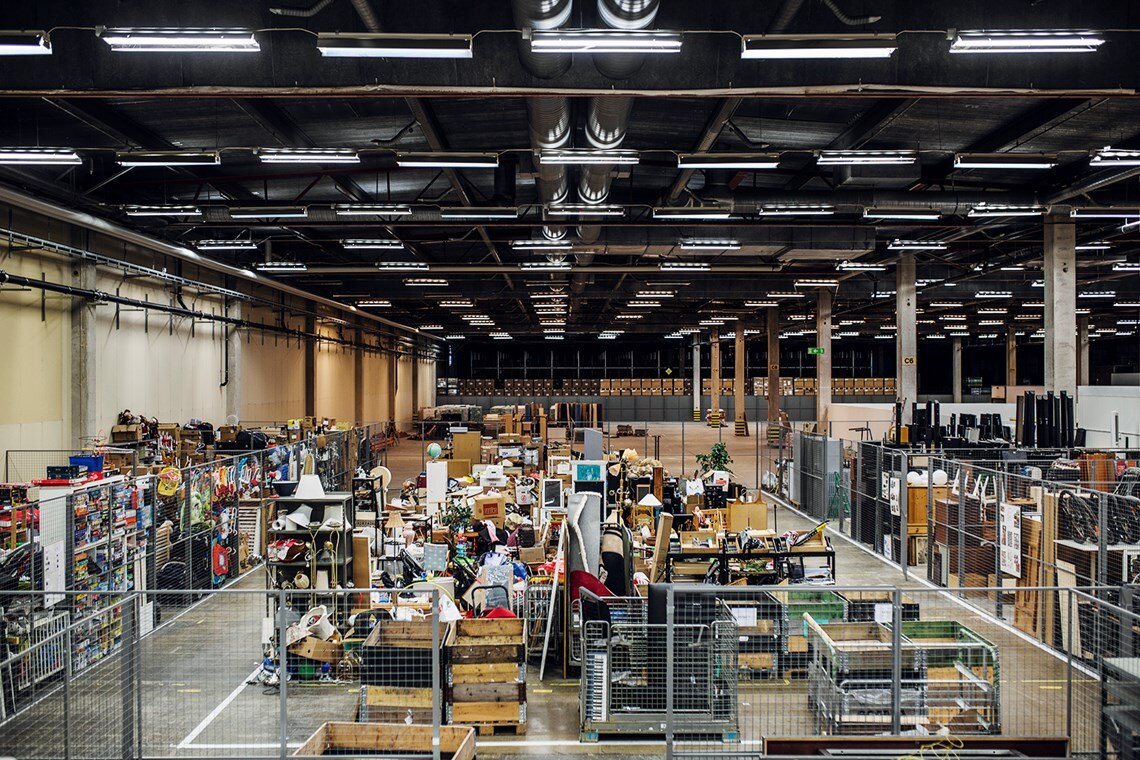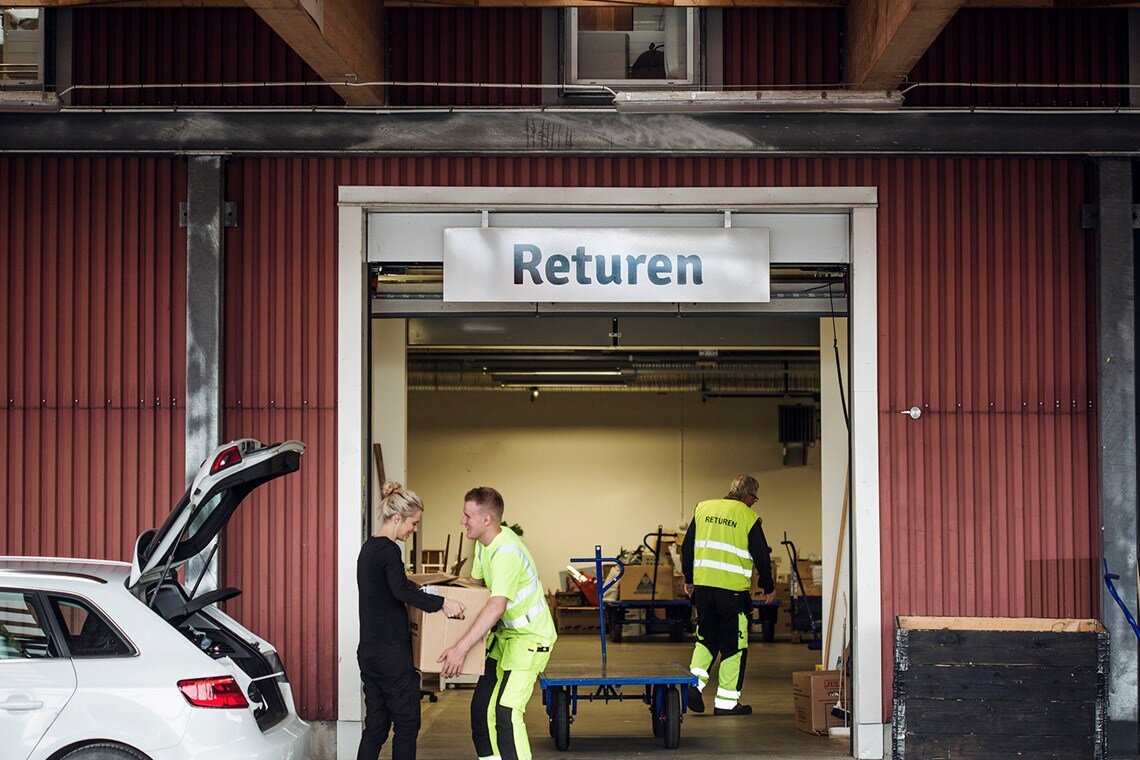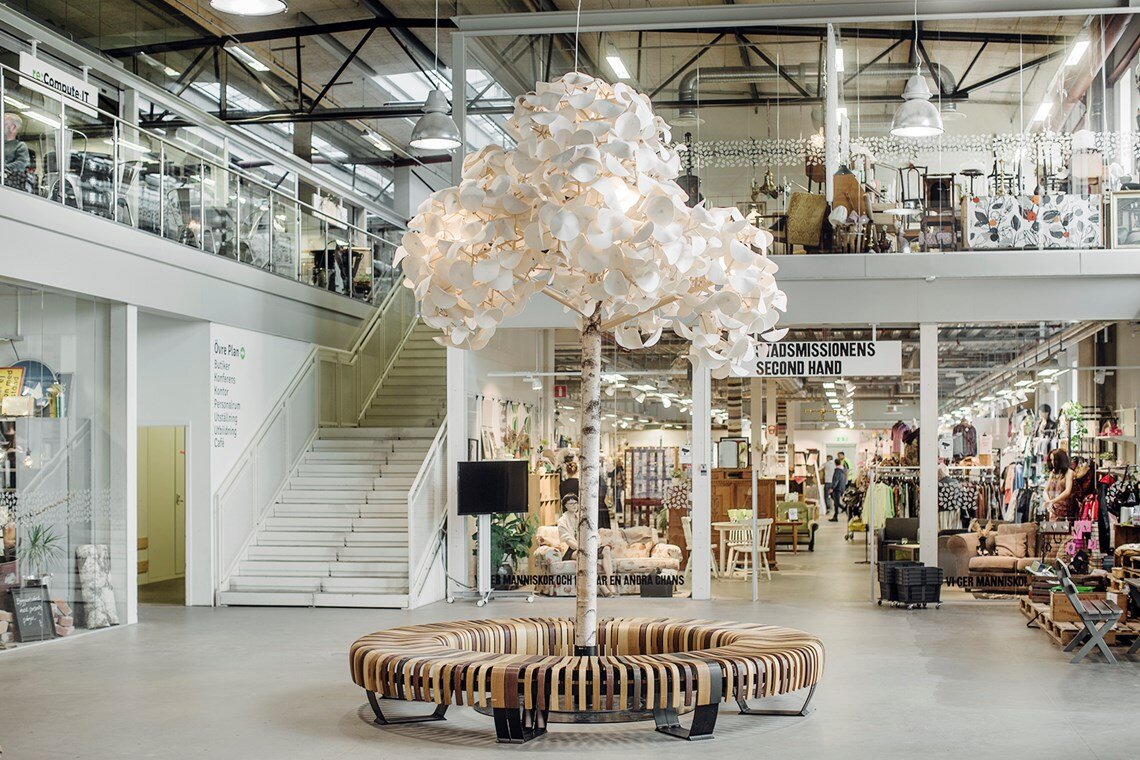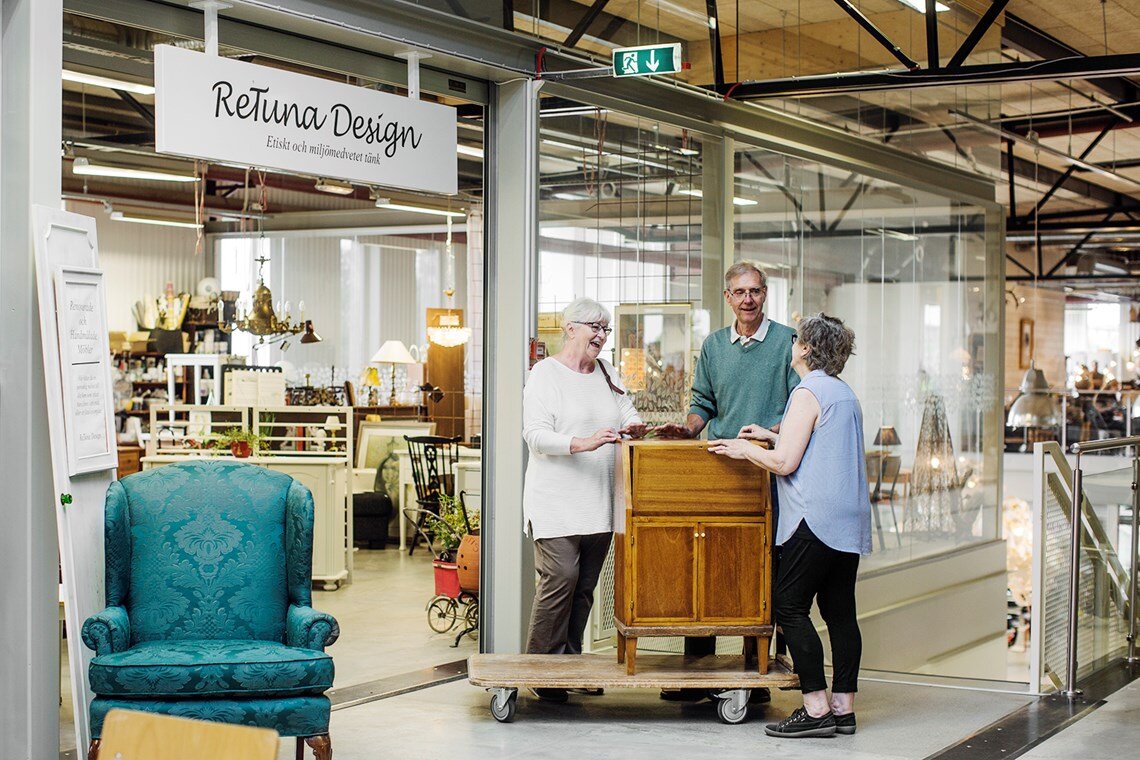A Swedish shopping mall where everything is recycled or upcycled. Also: 11 things you may be recycling wrong
From the BBC News feature article:
Anna Bergstrom had a dilemma. She loved the glitzy world of high fashion, but had also come to feel that it was unsustainable and bad for the planet. She's now found peace of mind by running a stylish shopping mall in Sweden, where everything is second-hand.
"Do you notice the smell?" Anna Bergstrom says, as she surveys her mall from the mezzanine level. "It smells nice here, doesn't it?"
It's very important to Anna that this place is enticing, because she feels it is making a statement. Everything for sale here, in 14 specialist shops covering everything from clothes to DIY tools, is recycled.





She is usually turned off by the smell of second-hand stores, she explains, even though she adores vintage fashion.
For most people flea-markets and charity shops carry a stigma, she thinks - a mark left by countless bad experiences. Too often they are worthy but depressing, Anna says. Her mission is to bring second-hand shopping into the mainstream.
The mall itself is spacious and appealing, almost Ikea-like. An art installation - a tree and circular bench all fashioned from recycled materials - greets customers at the entrance.
There is even a coffee shop and gift-wrapping service.
The mall is called ReTuna. "Tuna" because that's the nickname for the city where it is based - Eskilstuna, an hour's train journey west of Stockholm - and "Re" because the goods on sale have been recycled or repurposed.
It was set up by Eskilstuna's local government in 2015, in a warehouse which used to house trucks for a logistics company.
The shops inside it are run as businesses rather than charities, and each pays a combined charge of rent and business rates.
Anna Bergstrom's business mantra which she repeats to each shopkeeper is, "Do it like Hugo Boss." She wants the mall to stand toe-to-toe with a regular, commercial, glitzy mall.
And here’s some excellent advice from Wild Minimalist about the 11 things you should not be placing in your recycling bin:
1. Plastic Bags: You’d be surprised how many people add soft plastic bags to their recycling bin, or even bag their recyclables in plastic before adding them to their cart. The problem with soft plastic bags is that they can clog machines and slow down operations while workers remove the bags by hand. Bring your own reusable tote with you when you’re out shopping to eliminate the need for a plastic bag. You can also recycle soft plastic at many grocery stores.
2. Pizza Boxes: If it’s got food stains or grease on it, it doesn’t belong in recycling. Lucky for us pizza lovers, cardboard boxes can be composted as can other food-soiled paper, so long as they’re not lined with plastic. A good example is take-out boxes—check the bottom of the box to see if it is labeled as compostable. Boxes with a shiny interior are most often lined with plastic and cannot be recycled or composted, unless your local municipality accepts them. Napkins and paper towels should always go in the compost.
3. Gift Wrap: Shiny, metallic wrapping paper and decorative ribbons do not belong in recycling. Glittery cards are also non-recyclable and can contaminate an entire bin of paper. When wrapping a gift, opt for an unlaminated paper like newspaper, paper bags or butcher paper. A good way to test if your gift paper is recyclable is to crumple it into a ball—if it stays bunched up, it’s most likely recyclable. If not, re-use it or throw it away.
4. Small metal bits: While bits of metal like soft drinks can tabs and aluminum confectionary wrappers are technically recyclable, their small size makes them hard to detect and they often jam recycling machinery. To avoid this issue, keep can tabs attached to the can or drop them inside the can when you’re done. Save bits of aluminum foil until it forms a large ball or place them inside an aluminum can and crimp the top shut before you place the entire can into recycling.
5. Receipts: While the thermal cash register receipts you receive from a grocery store or boutique are made from paper, they also contain Bisphenol A, aka BPA, the nasty cancer causing chemical. When you recycle receipts, the BPA that they contain gets processed with other paper pulp and contaminates the recycled paper products that are being produced. It’s best to ask for no receipt when you’re shopping, or throw it away and wash your hands.
6. Food Residue: Cleaning out food and beverage containers before you recycle them is just as important as placing them in the right bin. Food residue and liquids left in take out containers, peanut butter jars and even wine bottles can contaminate an entire truckload of recyclables. Containers don’t have to be perfectly clean, but they should be rinsed and washed with soap if they’re greasy.
7. Broken Crockery: We’re all prone to breaking things. Unfortunately, broken plates, ceramics, porcelain, mirrors, light bulbs, cups, wine glasses and pyrex have different melting points and chemical compositions compared to recyclable glass and belong in the trash. Donate plates, cups and glasses in good working condition, and reuse broken crockery for another purpose at home or a craft project.
8. Nappies: Yuck, and no! Hopefully, it’s no surprise that dirty nappies and sanitary products have no place in the recycling bin. Whether they are clean or dirty, they go in the trash. There are some compostable diapers, but most municipalities do not accept them in municipal compost bins. Look into a compostable diaper service that drops off clean diapers and picks up dirty diapers to compost at a dedicated facility, or switch to reusable cloth diapers and reusable pads or a menstrual cup.
9. Shredded Paper: This one surprised me. Shredded documents and small bits of paper are too small to be valuable to recyclers and fall through the cracks or can even clog equipment. The good news is shredded paper can be composted! If composting isn’t an option, you can collect shreds in a paper bag, staple it closed and place it into recycling.
10. Coffee Cups: Most to-go coffee cups are lined with a plastic film that makes them liquid proof, and difficult to recycle. The plastic lid might be recyclable, but it will depend on what type of plastic is accepted your local municipality. The paper heat sleeve that goes around the cup to protect your hand is really the only part of a to-go coffee cup that is likely recyclable or compostable. Better yet, say no to disposable cups and bring your own reusable coffee cup with you when you’re on the go.
11. Paperboard Boxes: Freezer food boxes and ice cream cartons contain a plastic polymer to prevent freezer burn. Unfortunately, this plastic coating prevents the box or carton from breaking down in the recycling process. Gable-topped milk and juice cartons are also made from a paper/plastic hybrid to prevent leaks and shelf stable cartons (sold in a rectangular box) contain additional plastic and aluminum layers, making them even more difficult to recycle. While some municipalities accept cartons for recycling, many do not, so it is best to check.
